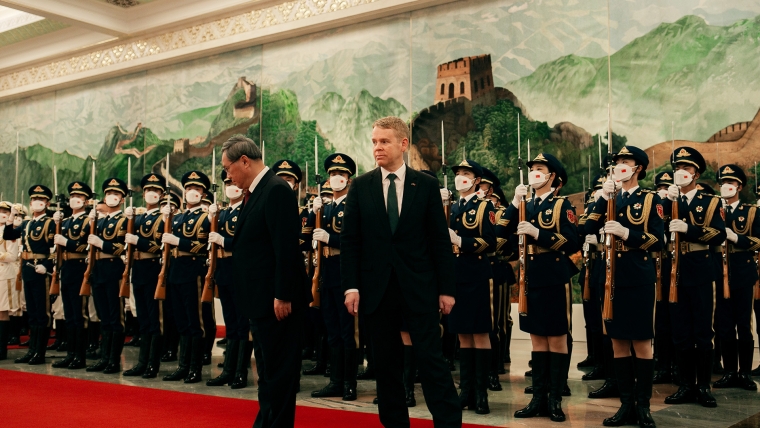
It was oppressively warm in Shanghai when Prime Minister Chris Hipkins got up to give a speech on reconnecting with China at the Folk Art Museum in Baoshan.
“He apiti hono, he tatai hono: that which is joined with purpose remains strong and unbroken,” he said.
Towering over the Prime Minister, and unafflicted by the 35 degree heat, was a thirty-foot kauri carving of a waharoa (a decorated gateway to a pā or marae) symbolising ties between New Zealand and China.
It was gifted to the people of China by John Key and Pita Sharples in 2010, after being displayed at the Shanghai Expo, and was carved from 3,000 year-old kauri by Te Puia.
Charlie Rahiri, head of Maori policy at the Ministry of Foreign Affairs, said Hipkins’ visit that day was fulfilling a promise made alongside the gift more than a decade ago.
“[A promise] that we will always come back and reconnect. It is not in our nature to leave things afar and not come back”.
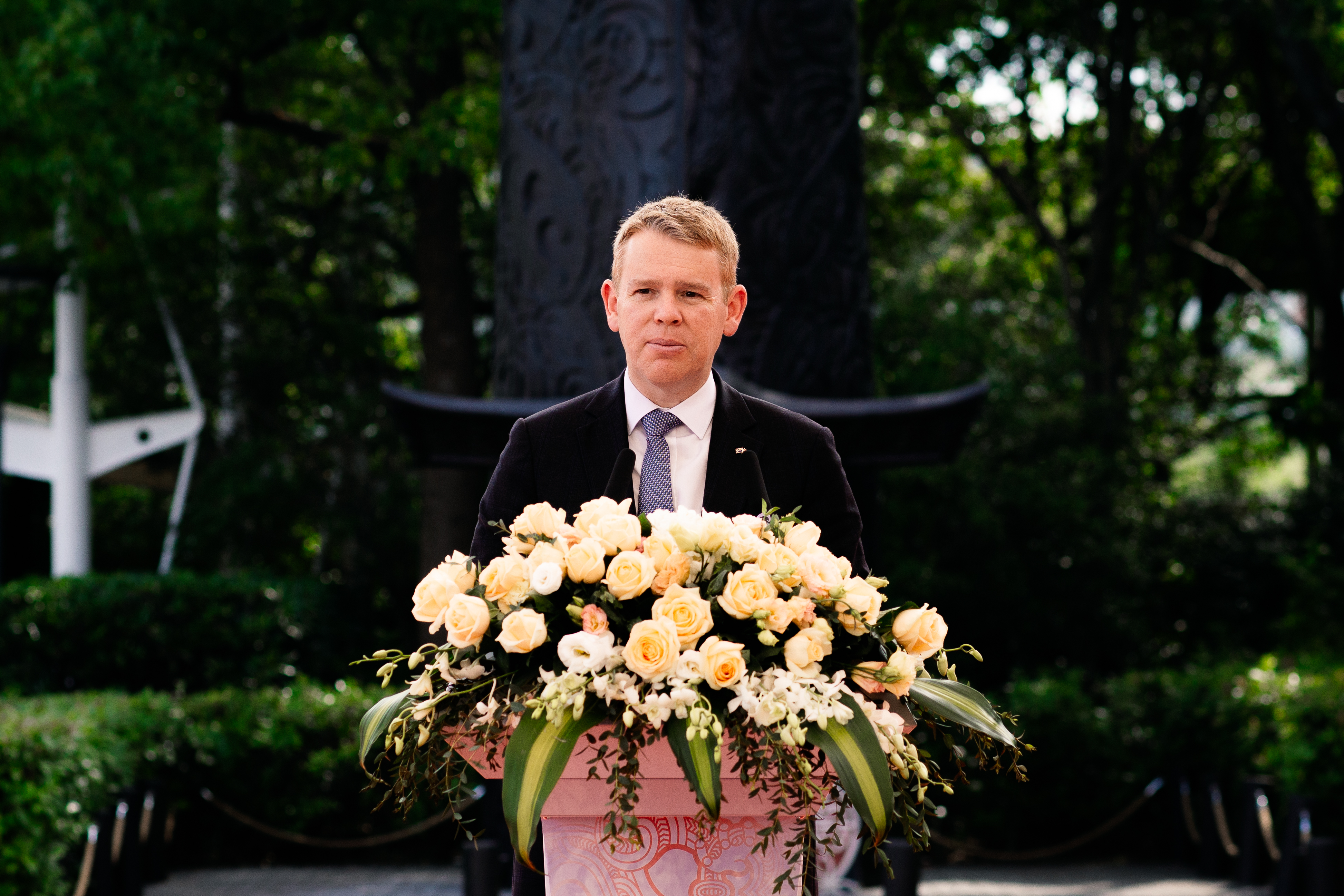
Any lingering doubt about whether New Zealand wants to cut ties with China should be put to rest. Hipkins’ five day visit was firmly focused on shoring up the relationship.
In a gauntlet-run of meetings, speeches, and functions, he delivered two key messages.
One: New Zealand is ‘open for business’. And, two: its relationship with China is ‘warm and constructive’. Each line was repeated at least eight times across the trip for emphasis.
Western countries have been struggling to define their relationships with the rising power which simultaneously poses threats and opportunities.
In public remarks, President Xi Jinping said he considered New Zealand a “friend” and encouraged it to view China as a partner, not an adversary.
A recent survey by Pew Research found more than a third of Americans view China as an ‘enemy’ and just 6% consider it to be a ‘partner’.
Asia NZ Foundation’s annual survey found New Zealanders had a warmer view, with 30% describing China as a ‘friend’ and 37% saying it was a ‘threat’.
The survey considered a country to be ‘threatening’ if respondents viewed it with ‘caution or suspicion’. Which does not necessarily mean they consider it a military or economic threat.
However, nearly two-thirds of New Zealanders were at least ‘fairly concerned’ about the possibility of conflict over Taiwan. Thirty percent were ‘very’ or ‘extremely’ concerned.
Unsurprisingly, Taiwan — or ‘Chinese Taipei’ in diplomatic language — did not come up often during the visit and public discussions were more likely to refer to broad “geopolitical risk”.
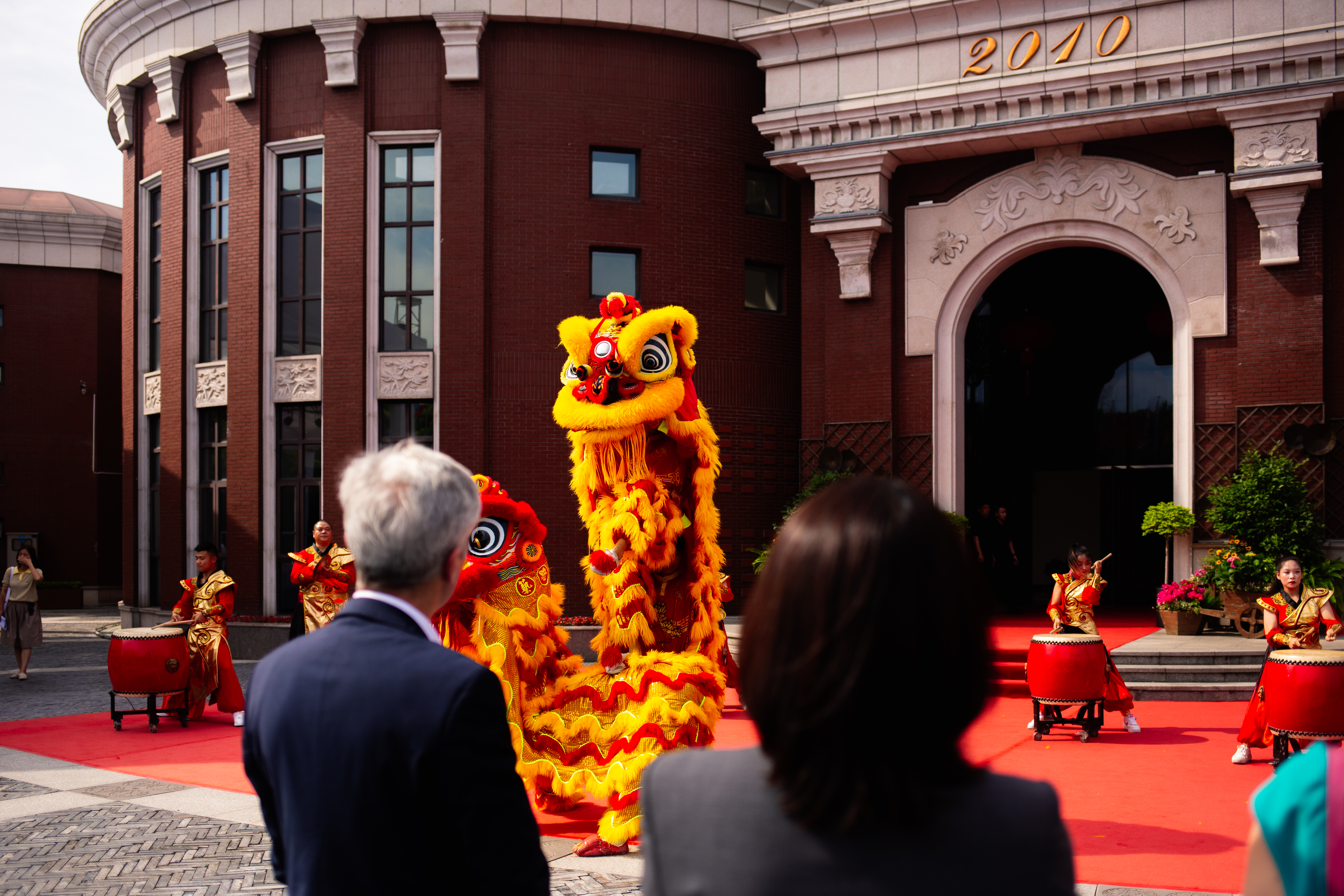
All competitors, foreign and domestic
A survey by the NZ Business Roundtable in China (NZBRIC) found geopolitics was the second biggest investment risk in the region, second to growing domestic competition.
“As businesses we recognize that differences will occur from time to time, and we appreciate the careful way in which New Zealand and China continue to manage any differences on specific issues as these may arise,” an NZBRIC spokesperson said.
Many of the 29 businesses on the PM’s trade delegation were looking to either expand their China operations, or break into the market for the first time.
The risk of being caught up in regional politics was a relatively small price to pay for access to such an enormous market.
Les Mills International, an Auckland-based exercise company, was on the delegation and looking to capitalise on the China market with specifically designed products.
It should understand the possible fallout from geopolitical risks; it had to suspend its business in Russia last year after the invasion of Ukraine.
There are other complications as well. Copy-cats frequently rip-off digital fitness videos and data privacy laws require a separate system from the rest of the global business.
But it’s all worth it; Les Mills will pursue a ‘China for China’ strategy with content, systems and products it has developed specifically for the local market.
This will help the company attract increasingly nationalist consumers who are choosing to buy more home-made products.
NZBRIC’s survey found this was the number one challenge facing NZ businesses in China, not geopolitical trouble — although the two are linked to some degree.
China’s economic success has turned a generation of workers into middle-class consumers and entrepreneurs that are making, buying, and selling in their own domestic market.
For almost three years, foreign businesses were partially locked out of China due to Covid restrictions and local businesses had an advantage. This reinforced the ‘buy local’ trend.
David Boyle, chief executive of PCNZ, said consumer behaviour shifted dramatically when lockdowns were lifted mid-2022 and local suppliers adapted faster than foreign exporters.
“And so, we saw competitive rivalry rising very, very quickly from local suppliers,” he said.
“If you didn’t have control of your supply chain, someone else was taking your space on the shelf and grabbing market share”.
Mattie Bekink, from The Economist Intelligence Unit, said the rise of nationalism meant foreign brands had lost a lot of prestige — although NZ dairy products remain popular.
“My best moment in lockdown in Shanghai was when I traded a slab of pork for a case of New Zealand milk, and it was a really big slab of pork,” she said.
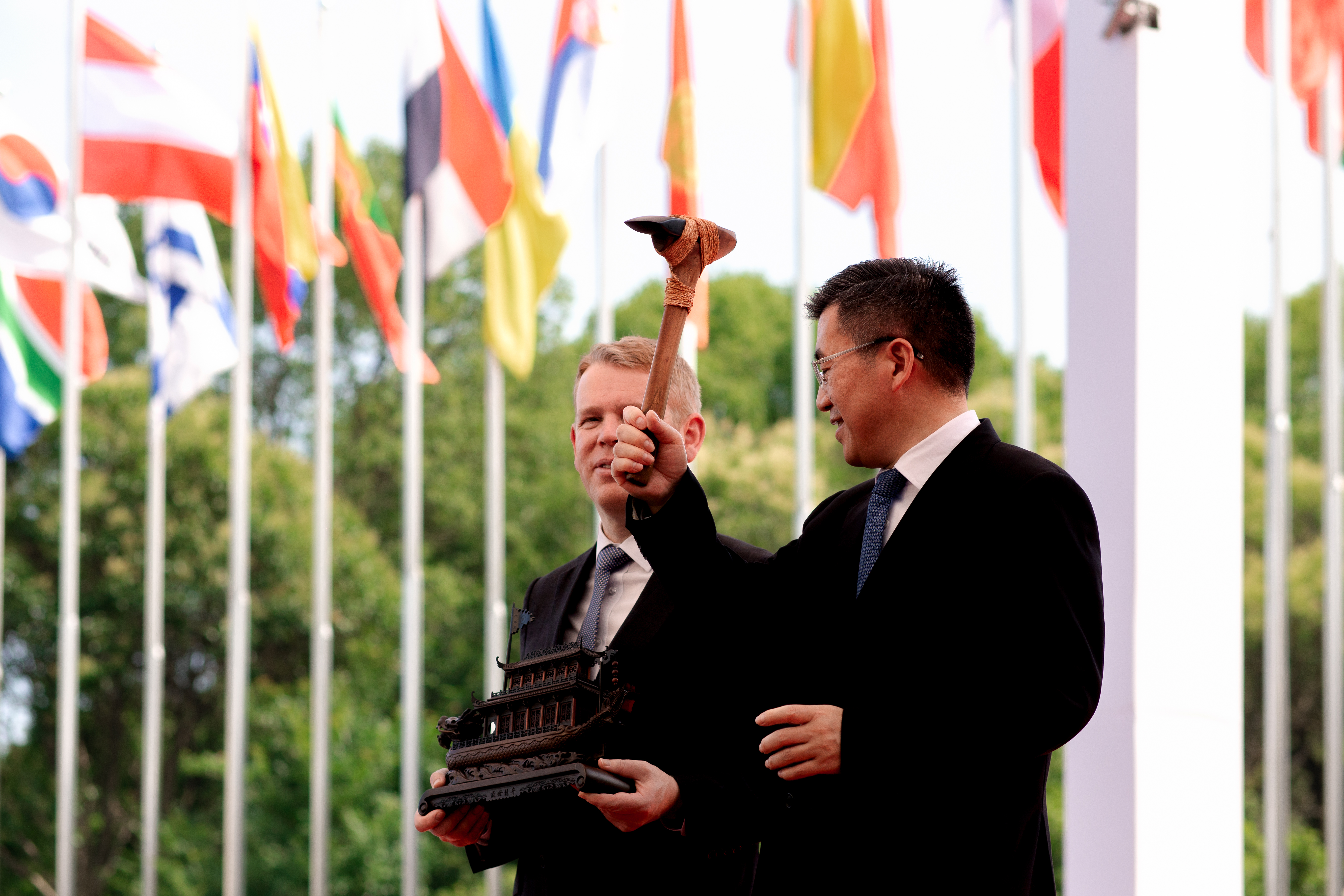
An uncomfortable world
Over the past 20 years, China has grown from roughly 4% of the global economy to over 18% today. It is now the second largest economy on Earth, behind the United States.
New Zealand’s exports grew by about $30 billion between 2000 and 2021. China accounted for $16 billion of that growth, while just $5 billion came from the rest of Asia.
A 2022 report, written by David Capie and Bethan Greener, said China’s growing economic heft had been “the single most important factor” in regional and global politics and security.
For decades, US-China relations had worked on the belief that Beijing would gradually be brought into the existing set of international rules and norms under US leadership.
“This was a comfortable world for New Zealand, in which there seemed few contradictions between closer economic ties with China and the deeper security relations with the US,” Capie and Greener wrote.
But that comfortable world has morphed into an uncomfortable era of “great power competition” as China competes with the United States for influence on the world stage.
The rising power has done what others have, and turned its economic success into military strength. President Xi has reportedly asked his military to be ready to recapture Taiwan by 2027.
This would be a worst-case scenario for New Zealand, which maintains a One China policy but wants to protect the status quo for as long as possible.
Any invasion of Taiwan would be met with economic sanctions from the US, at least, and could trigger a full-scale military confrontation at worst.
In meetings with Chinese leadership, Hipkins reaffirmed the One China policy but also raised the war in Ukraine — which China has refused to condemn.
“I urged China to use its influence to encourage Russia to act consistently with its international obligations and cease its illegal war in Ukraine,” he said in a statement.
Tensions in the South China Sea and the Taiwan Strait were also discussed, although talks were said to have focused on trade and economic issues.
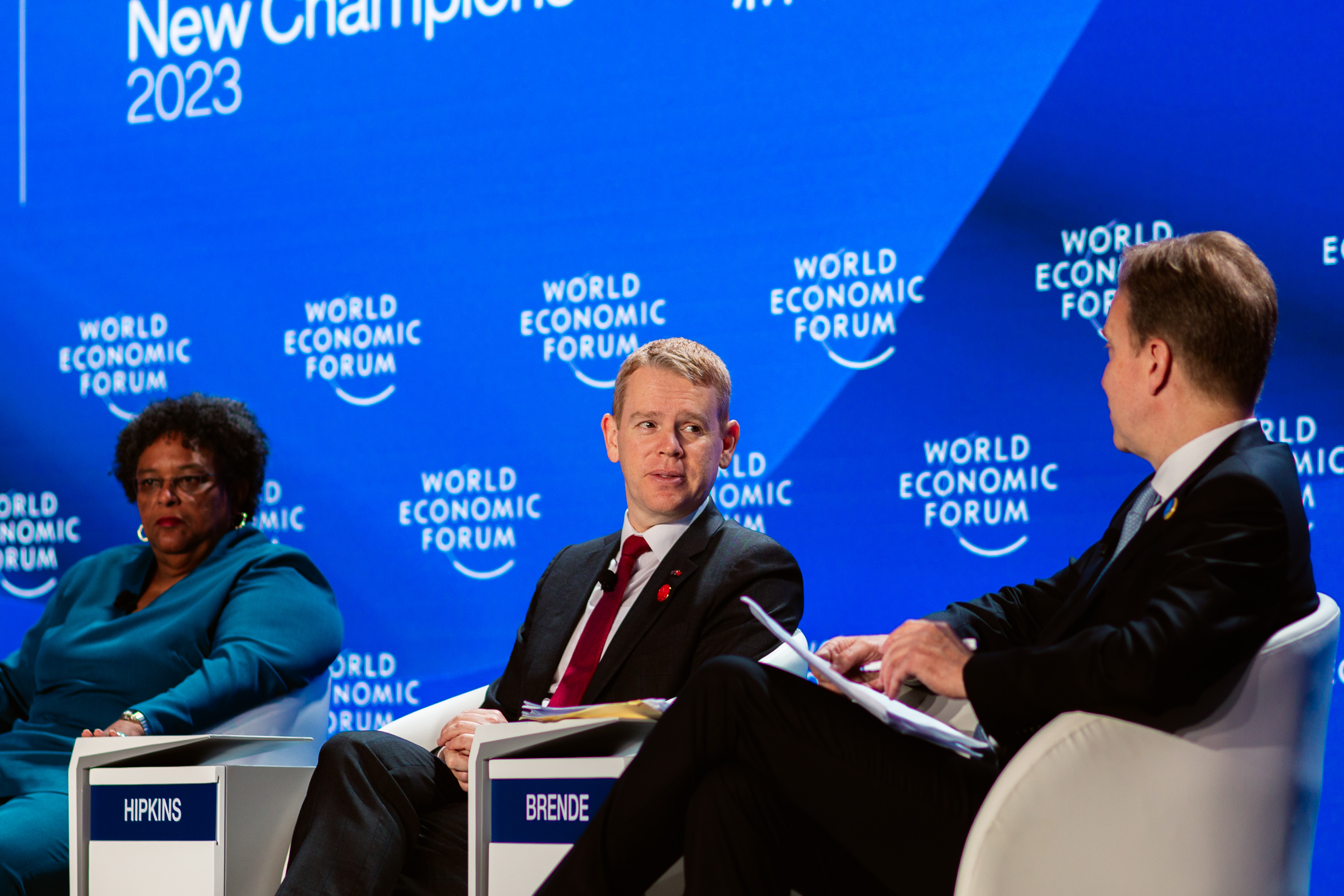
Look out, world!
Hipkins did not reserve criticism for China, alone. Some comments he made on a panel at the World Economic Forum conference in Tianjin were interpreted as a veiled jab at the US.
When asked about decoupling and economic protectionism, Hipkins said he wanted the world to remain “open and outward looking”.
“There is a trend in some parts of the world to be more inward looking. Some of that, I think, is driven by the challenges that we all face as a planet”.
Where there's more uncertainty, where there's a greater drive towards security and resilience, it can encourage countries to look for solutions to those problems.
But actually I think looking outward is how we're going to solve those problems,” he said.
‘Decoupling’ has become a common term to describe countries that are seeking to reduce their reliance on the Chinese economy.
However, members of the business delegation were much more keen on the European model of ‘de-risking’ rather than ‘decoupling’.
Pete Chrisp, chief executive of NZ Trade and Enterprise, told Reuters that China would be a fundamental trading partner for the foreseeable future.
Businesses would use a “China and” strategy, by diversifying into other markets while still growing in China.
Prior to departing, Hipkins told reporters that his government was focused on market diversification for exporters.
“You see that in the UK Free Trade Agreement, the European Union Free Trade Agreement, but we also have to continue to strengthen our relationship with China as well”.
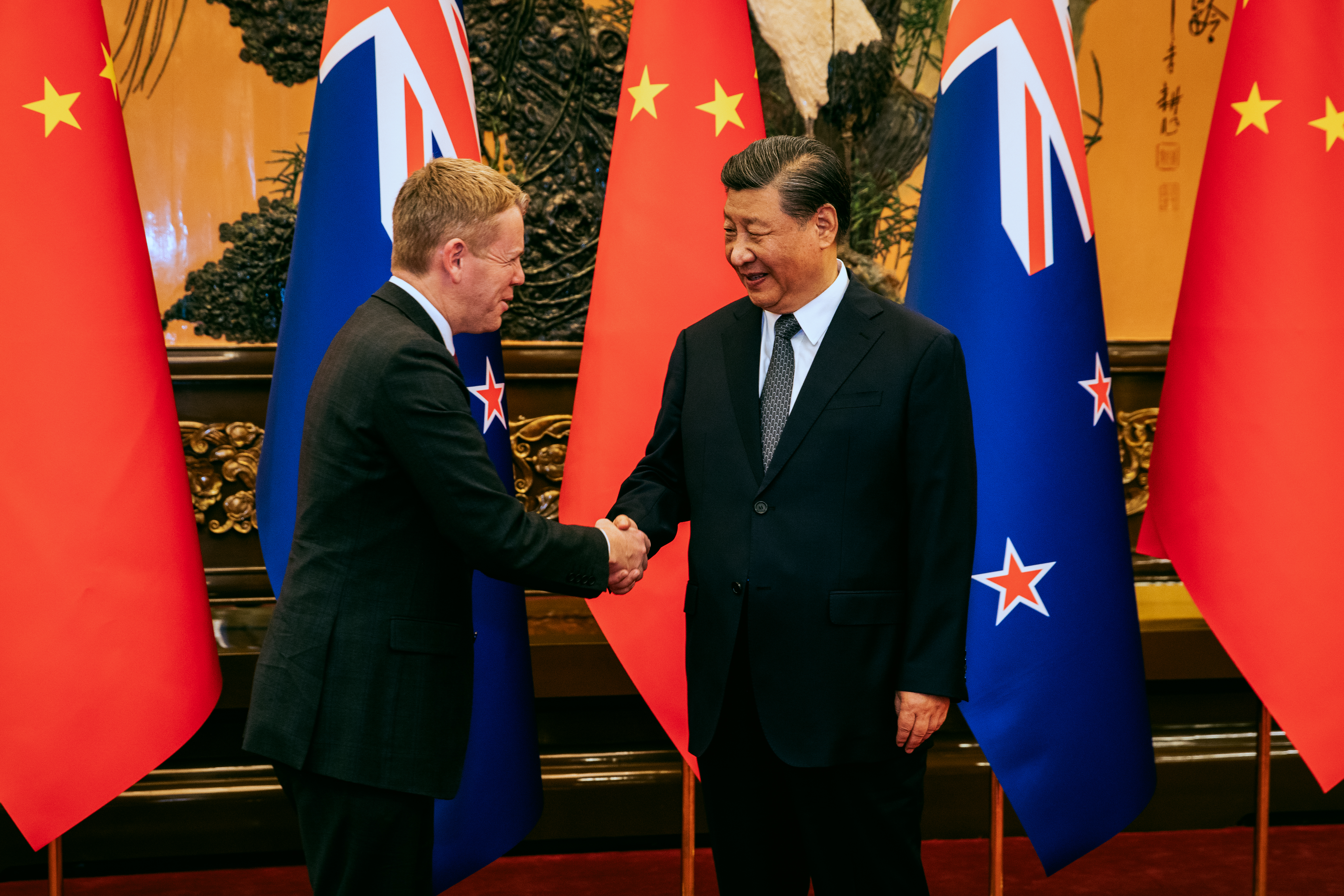
Hundreds of handshakes
Jamie Tuuta, chair of Sealord and head of the business delegation, said Hipkins’ handshake with China’s leadership helped to open doors for New Zealand businesses.
“The fact that the Prime Minister had access to the top three in China is very important for business and economic relationships, that’s certainly the feedback from our customers,” he said.
New Zealand’s trade delegation, and the kapa haka travelling with them, had received huge amounts of media coverage on Chinese social media.
Te Matatini winners Te Whānau-ā-Apanui performed a haka on the Great Wall of China and a video of that went viral on platforms such as Weibo and Douyin.
The kapa haka was a highlight at the otherwise dry events and even prompted a question as to whether Te Whānau-ā-Apanui had outshone the Prime Minister.
Tuuta said Chinese views on the diplomatic and political relationship with New Zealand was important for getting deals done on the ground.
For example, state-owned airline China Southern referenced the relationship when it announced it would add more flight capacity into Auckland and Christchurch.
“President Xi Jinping pointed out that China-NZ bilateral relations have maintained sound and steady development, and China regards New Zealand as an important partner and friend,” the company president said in a speech.
The extra capacity was understood to have been brought forward to align with Hipkins visit and will help to attract more Chinese tourists.
Air New Zealand has its flight capacity back to near pre-Covid levels but many seats have been sitting empty. Demand for travel to and from China remains much lower than pre-pandemic.
This is due to slow visa processing by Immigration NZ, high cost of travel due to inflation, and poor diplomatic relations between China and Western countries.
One person involved in the travel industry said having Hipkins appear in Chinese media talking up the warmth of the NZ-China relationship would help with the latter problem.
Which was Hipkins’ hope for the trade mission: reestablish ties and shore up exports.
He has thawed out a key trading relationship after it was put on ice during the pandemic, and has done it without stepping on any tripwires.
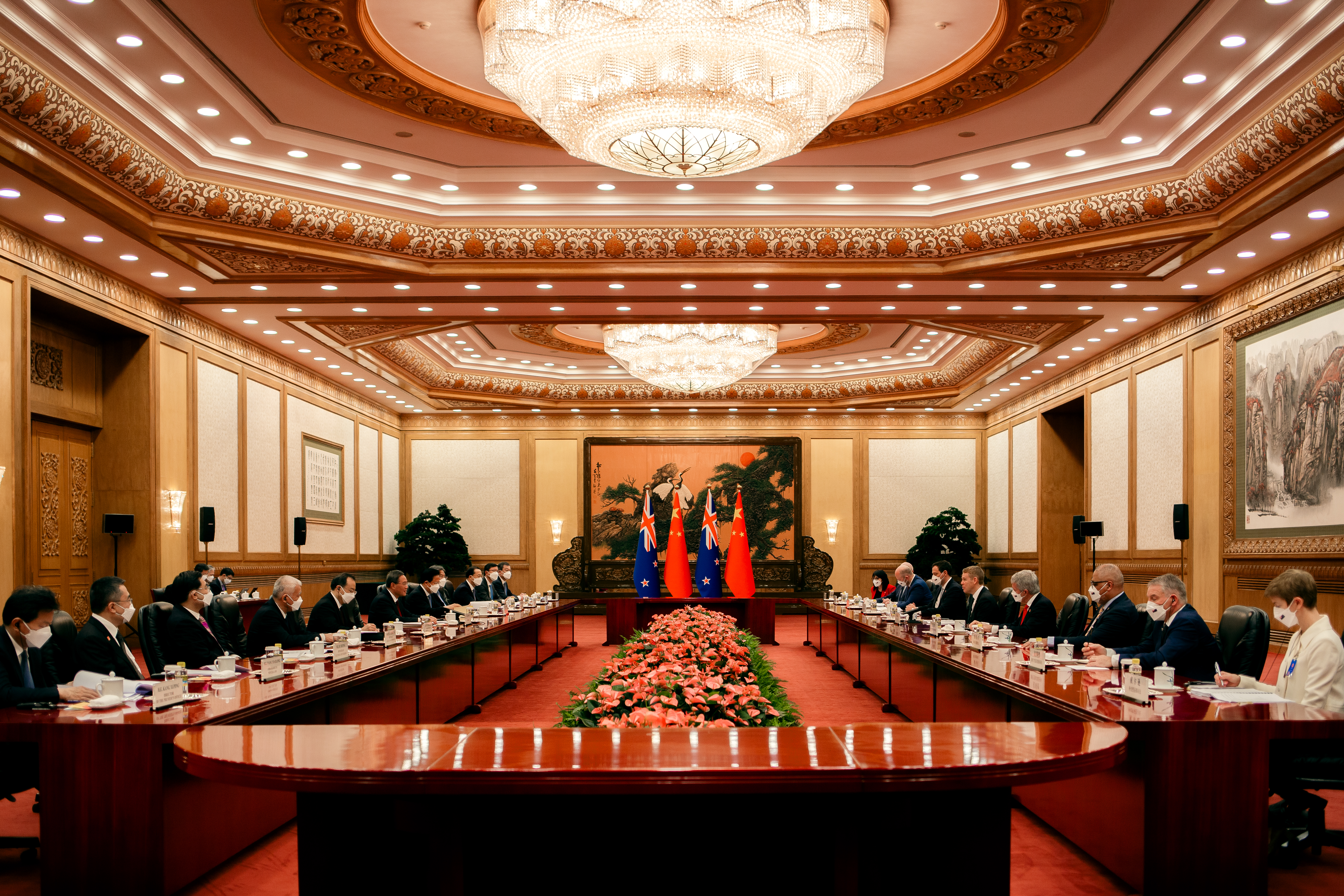
15 Comments
With thousand years of history, it is about right to use 100 years to test whether a friend is a true friend.
Very lucky he even got his “45 mins”.
China is desperate for friends - we fell perfectly into their lap (or trap) tbh.
The rest of the west is busy distancing itself and pulling back supply chains from China - whilst we seem to be keen to extend our trading relationship. Great pictures of Xi and Chippy to show their peasants what great friends they have in the west
This article overlooks that there are very good reasons that the rest of the world is distancing itself from what is an increasingly powerfula\ dictator with less and less allies in the west and more and more animosity to his own people and the west. And a growing desire to invade Taiwan and partner with other semi-lawless, dictatorship - BRIC nations
The argument that the European strategy to de-risk rather than decouple ... also not logical. Europe has a history of poor decision making in its strategies for dealing with dictatorships - most recently in relying on russia for gas. .. those are decisions made due to the fragmentation of decision making between multiple countries that all have different positions and lobbyists relating to china.
Our approach is quite similar to the NZ reluctance to slow the rise of house prices even when we know in the long term its bad for us. - we seem want the money now and try to ignore the long term consequences of todays decisions - being the very high risk of the US and Europe cutting ties with china and stopping allies from trading also.
New Zealand needs China far more than China needs us. Everyone knows it, every shelf in your local Warehouse, Farmers, Mitre10, Repco and JB Hifi knows it. Talk about de-risking/diversifying away from China is economically absurd: Vietnam, Bangladesh, Philippines and the entirety of the EU does not have the supply chains, technology, production know-how and volume to even come close to replacing Chinese output. As for dictators and tyrannies. Everyone knows that the west has no problem with dictators or tyrannies as long as they are OUR dictators and tyrannies.
As for the US strategy of using Taiwan as a pawn to escalate economic and military tensions with China. We'd be better off remembering that the US needs to ramp up this artificial conflict in order to maintain its number one global position. However, Taiwan is part of China and that has been internationally accepted since 1971 when Taiwan was expelled from the UN. The US also formally accepted this as the basis of its diplomatic relations with China.
Yeah Australia is definitely distancing itself from China by reducing its sales of iron ore and coal... hang on, no its not. Meanwhile they try to play some sort of micky mouse game of international geopolitical alliances that makes zero sense.
CCP not China
It's the Communist Party of China, CPC.
What an excellently written, researched and balanced article from interest.co.nz.
Such a refreshing difference to the often propaganda and biased 'news' from foreign owned sources and US social media feeds.
"A recent survey by Pew Research found more than a third of Americans view China as an ‘enemy’ and just 6% consider it to be a ‘partner’. "
A survey no doubt with loaded questions
Glad to see we are not biting the hand we feed.
Exactly
Good work Chris.
The deputy vice-chancellor at the University of Melbourne makes the point that cutting research and university ties with China will likely hurt Australia much more than it hurts China: "It's mistaken to believe that ending collaboration with Australian universities will hamper China’s rise as a technology power. China has already risen. Since the mid-1990s, China’s investment in basic research grew by an average of more than 20 per cent a year, to a point where it is now many multiples of Australia’s research spending. Its nine leading universities are much better funded than any of Australia’s, or the world’s outside the elite American universities. According to recent studies referenced in the journal Science, Chinese researchers account for the highest proportion of the most cited scientific papers of any country in the world. Other studies also show Chinese research is rising fast in innovation and quality. To completely disengage from this already significant and still ascending knowledge power would be an act of self-harm for Australia and its universities. Universities depend on access to the best talent and best ideas and, of course, these are not concentrated in any particular segment of the world’s population. Closing off our knowledge sector from one-fifth of humanity, and a research system that is growing in resources and capability, would be a major mistake." https://afr.com/policy/health- Link
Very chummy with China these days aren't we. Beware the dragon, however.
New Zealand has had good relations with China for generations. What we should beware of is Taiwan agreeing to be cannon-fodder on behalf of US geostrategic games and NZ getting suckered into a super-power conflict which will devastate us.

We welcome your comments below. If you are not already registered, please register to comment
Remember we welcome robust, respectful and insightful debate. We don't welcome abusive or defamatory comments and will de-register those repeatedly making such comments. Our current comment policy is here.